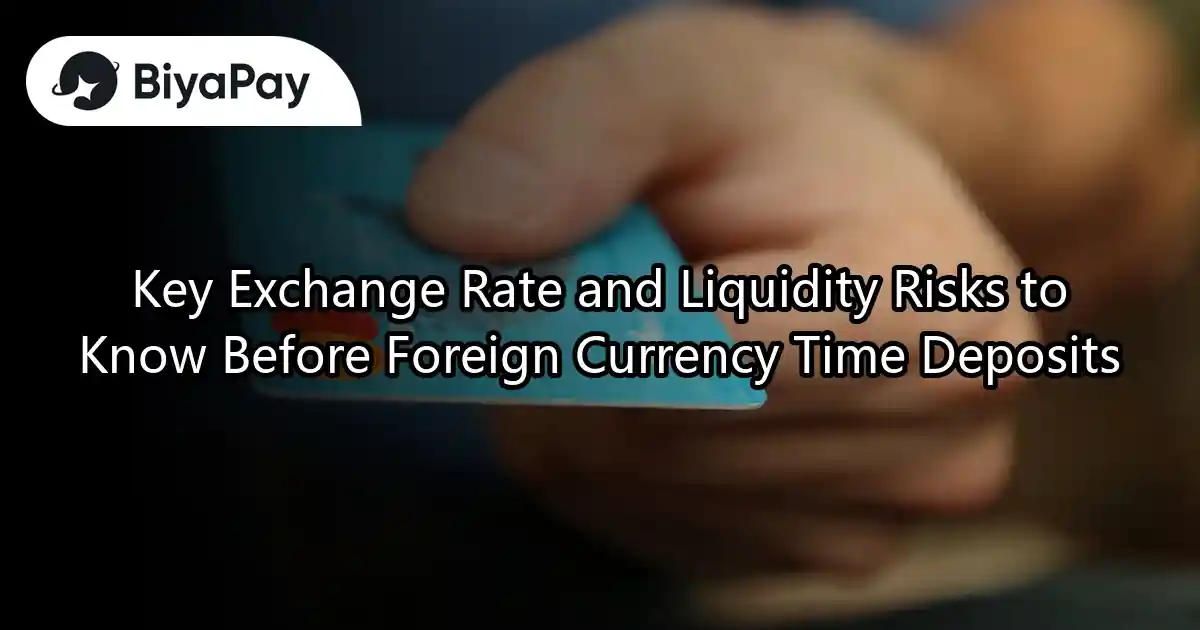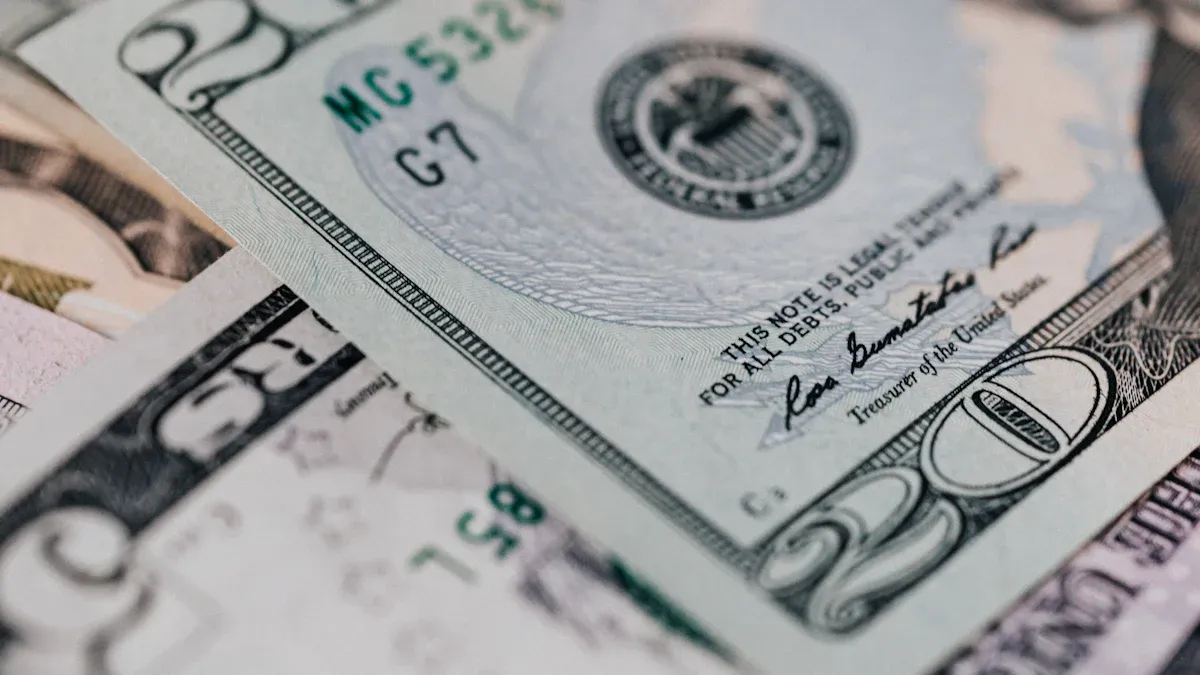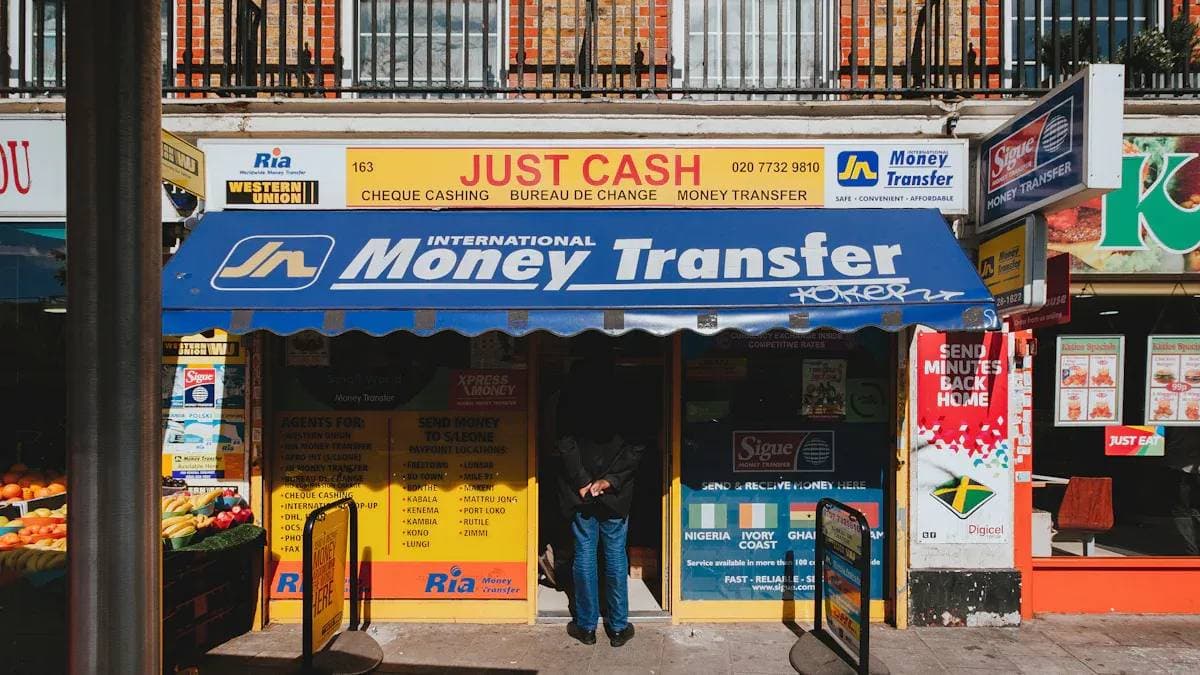- EasyCard
- Trade
- Help
- Announcement
- Academy
- SWIFT Code
- Iban Number
- Referral
- Customer Service
- Blog
- Creator
Key Exchange Rate and Liquidity Risks to Know Before Foreign Currency Time Deposits

Image Source: unsplash
Do you think high interest rates on foreign currency time deposits guarantee profits? In fact, if the exchange rate drops, even your principal could be lost. Exchange rate fluctuations and limited liquidity are the two major risks you must face when investing in foreign currency time deposits. According to multiple fund prospectuses, exchange rate changes and insufficient liquidity can affect your actual returns, potentially leading to exchange losses or increased transaction costs. Taiwan’s life insurance industry has massive overseas investments, and the central bank needs to deploy USD 150 billion to provide hedging services, reflecting significant systemic risks in foreign currency assets. You must make prudent choices based on your financial needs, risk tolerance, and understanding of currencies.
Key Highlights
- Exchange rate fluctuations in foreign currency time deposits directly affect principal and interest; a falling exchange rate may offset your earned interest or even result in a loss of principal.
- Conversion costs cannot be ignored; frequent conversions increase fees, and it’s advisable to hold commonly used currencies long-term to save costs.
- Foreign currency time deposit funds are locked, and early withdrawal typically results in loss of interest or even principal; invest only idle funds and reserve emergency cash.
- When choosing foreign currency time deposit products, carefully review terms and risk disclosures, understand interest rates, deposit terms, and early withdrawal rules to avoid hidden risks.
- Diversifying investments across different currencies and products can effectively reduce risks, and allocate assets and deposit terms reasonably based on your risk tolerance and financial needs.
Exchange Rate Risks

Image Source: pexels
Exchange Rate Fluctuations
When you choose foreign currency time deposits, exchange rate fluctuations directly affect your principal and interest. Exchange rates change daily, sometimes experiencing sharp volatility in a short period. For example, on March 23, 2023, the day the U.S. Federal Open Market Committee (FOMC) meeting was announced, the USD/KRW exchange rate fell from 1,307.7 to 1,278.3, depreciating by about 2.25% in a single day. Such fluctuations can cause significant value changes in your foreign currency time deposit principal in the short term. Many short-term traders in the market drive rapid rises and falls in exchange rates, making it difficult for you to predict the actual returns when converting back to HKD. You must understand that exchange rate fluctuations are influenced not only by economic data but also by market sentiment and collective behavior.
Earning Interest but Losing Value
You may think that higher interest rates on foreign currency time deposits guarantee profits, but in reality, when exchange rates fall, interest earnings are easily offset by exchange losses. This situation is called “earning interest but losing value.” For example: you deposit USD 10,000 in a Hong Kong bank for a one-year foreign currency time deposit with a 2% annual interest rate. After one year, you receive USD 200 in interest, but if the USD/HKD exchange rate falls by 2%, the actual loss when converting back to HKD has already offset all the interest, and you may even lose part of your principal. You can use the following simple method to calculate the impact of exchange rate changes on returns:
Calculation Method:
- Calculate the principal plus interest (principal + interest) at the maturity of the time deposit.
- Assume the exchange rate falls by x%, multiply the principal plus interest by (1 - x%) to get the actual amount in HKD.
- Compare the original principal with the converted amount to assess whether there is a loss.
You should choose currencies you are familiar with and confident in, and closely monitor political and economic news in the relevant countries, as these factors affect exchange rates.
Conversion Costs
When engaging in foreign currency time deposits, conversion costs directly impact your actual returns. Hong Kong banks typically have a gap between the buying and selling prices when converting USD. For example, on a given day, the USD spot exchange rate buying price is 29.125, and the selling price is 29.275, with a difference of 0.15, resulting in a conversion cost of about 0.51%. This means you pay about 0.5% in costs each time you convert, equivalent to one to two years of interest on TWD time deposits. You should try to hold commonly used currencies long-term to reduce frequent conversions, thereby saving costs.
| Exchange Rate Type | Bid-Ask Spread Range (%) | Conversion Cost Description |
|---|---|---|
| Cash Exchange Rate | About 2.27% | Highest cost for exchanging cash, suitable for travel, higher cost. |
| Spot Exchange Rate | About 0.3% | Used for foreign currency account conversions, lower cost, suitable for investments and remittances. |
| Forex Margin Trading | About 0.006% | Extremely low bid-ask spread, suitable for frequent trading, lowest cost. |
You must remember that banks generally do not charge additional fees, and conversion costs mainly come from the bid-ask spread. You should avoid multiple conversions in the short term to preserve more interest earnings.
Tip:
You can periodically check the exchange rate trends and conversion costs of foreign currency time deposits and adjust based on your financial needs and risk tolerance.
Liquidity Risks

Image Source: pexels
Funds Lock-Up
When you choose foreign currency time deposits, you must note that funds will be locked for a period. During this time, you cannot freely withdraw principal or interest. Hong Kong banks generally require you not to access these funds before the deposit matures. For example, if you deposit USD 10,000 in a foreign currency time deposit with a one-year term, you cannot use these funds during that year. This affects your cash flow and daily expense planning. If you suddenly need cash, these funds cannot be used immediately.
Tip: You should only use idle funds for foreign currency time deposits, keeping daily and emergency expenses in a demand account.
Early Withdrawal
If you need to withdraw your principal before the foreign currency time deposit matures, Hong Kong banks typically impose penalties or deduct earned interest. Some banks may even reclaim all interest, returning only the principal. For example, if you deposit USD 10,000, originally earning USD 200 in interest over one year, and you withdraw early, the bank may only return your principal or even charge a handling fee. This means you not only lose interest but may also incur additional costs.
| Early Withdrawal Scenario | Potential Loss |
|---|---|
| All Interest Deducted | No interest income |
| Additional Handling Fee Charged | Principal reduced |
| Partial Interest Returned | Significant reduction in interest earnings |
You must clearly understand the bank’s early withdrawal terms to avoid losing interest or principal due to unexpected needs.
Deposit Term Selection
When choosing foreign currency time deposits, the length of the deposit term affects your liquidity and risk. Generally, 3- to 6-month terms are more flexible. This allows you to reduce the time funds are locked and mitigate risks from long-term exchange rate fluctuations. If you choose a one-year or longer term, while interest rates may be higher, liquidity will significantly decrease. You should select an appropriate term based on your financial needs and risk tolerance.
Suggestion: You can split your funds into portions for 3-month, 6-month, and 12-month foreign currency time deposits. This enhances cash flow flexibility.
You should also reserve emergency funds in a demand account to avoid liquidity shortages affecting daily life or unexpected expenses.
Foreign Currency Time Deposit Product Selection
Terms Details
When choosing foreign currency time deposits, you must carefully review product terms. Different banks’ foreign currency time deposit products may vary in interest rates, deposit terms, and early withdrawal clauses. Some banks offer higher rates during promotional periods, but rates drop after the promotion ends. You should note whether there is automatic renewal, early withdrawal penalties, or minimum deposit requirements. It’s recommended to choose banks with automated services for easier fund management.
Tip: Before opening an account, you should request complete terms documents from the bank and ask about any unclear details.
Product Differences
There are various foreign currency products in the market, some linked to currencies, which are not traditional time deposits and carry higher risks. You should pay special attention to the structure and return sources of these products. Arbitrage and interest rate differences between products affect your actual returns. For example:
- Banks use offshore non-delivery settlement models to directly transfer foreign currencies, earning exchange rate spreads.
- Companies engage in arbitrage by constructing transaction backgrounds, profiting from exchange rate differences.
- When interest rate differences are significant, funds flow to higher-rate countries. For instance, U.S. deposit rates at 2.5%, Japan at 0%, after one year, funds in the U.S. can grow to 1.025 million JPY, while in Japan they remain at 1 million JPY. This directly impacts your investment returns.
You should compare the terms and returns of different foreign currency time deposit products to choose the most suitable option.
Risk Disclosure
When purchasing foreign currency time deposit products, you must carefully review risk disclosure statements. Banks disclose related risks based on international standards (e.g., IFRS S1, S2) and may hire third-party agencies to audit reports, enhancing information credibility. Some banks cite official statistical data to help you better understand potential product risks. You must ensure you understand all risks, including exchange rate fluctuations, liquidity restrictions, and product structure risks.
Note: You should choose products with complete risk disclosures and third-party audits to protect your rights.
Diversification and Hedging Strategies
Diversified Investment
You should not put all your funds in a single currency or product. Diversified investment can effectively reduce risks. According to S&P 500 data, in June 2023, the number of effective stocks fell to 60, with index concentration reaching a new high. Mega-cap stocks like Microsoft, Apple, and Amazon accounted for over half, increasing concentration risk. Index providers have rebalanced, highlighting the importance of diversified investment.
UBS Asset Management statistics show that correlations between stocks in different regions have decreased, meaning overall volatility decreases when you invest in multiple markets. Markowitz’s theory also suggests that combining low-correlation assets in a portfolio can achieve higher returns at the same risk level.
You can consider allocating funds to different currencies, countries, and product types, such as stocks, bonds, and commodities. This way, even if one market or currency fluctuates, your overall losses are reduced.
Tip: Risk parity strategies, with a 40-year history, have proven stable returns across economic environments, particularly during the 2008 credit crisis.
Asset Allocation
You must allocate assets based on your risk tolerance and investment goals. Cathay Robo-Advisor uses modern portfolio theory and quantitative models to dynamically adjust optimal allocation ratios based on your risk profile and investment horizon. These models analyze asset correlations to help you maximize returns at the same risk level.
You should reserve a portion of funds as liquid cash in demand accounts or short-term products to cover unexpected needs. The remaining funds can be allocated to different asset classes to enhance portfolio stability.
According to Eastspring Investments’ analysis, mixed stock-bond portfolios offer better risk-adjusted returns than pure stock portfolios, with longer investment periods yielding more stable returns. You can consider dividing funds into stocks, bonds, and cash, adjusting flexibly based on your needs.
Taxes and Fees
When diversifying investments, you must pay attention to tax regulations in different countries and regions. Some countries tax foreign currency interest income or capital gains. You must check relevant tax rates to avoid tax issues affecting final returns.
Additionally, different products and banks charge various fees, including conversion fees, management fees, and early withdrawal fees. You should compare these fees before investing and choose cost-effective options.
If you choose foreign currency time deposits, calculate conversion costs and potential tax expenses to ensure actual returns meet expectations.
Note: All fees and taxes directly affect your final returns, so calculate them carefully.
When considering foreign currency time deposits, you must understand that exchange rate fluctuations and liquidity risks affect your actual returns. You can reduce risks by:
- Diversifying investments across different currencies and products
- Choosing appropriate deposit terms
- Carefully reviewing all terms
- Reserving sufficient liquid funds
Before investing, you should make informed decisions based on your financial situation and risk tolerance. If in doubt, consult professionals.
FAQ
Do foreign currency time deposits have minimum amount requirements?
Most Hong Kong banks require a minimum deposit amount, typically USD 1,000 or more. You should review bank terms to ensure funds meet requirements.
How much will I lose if the exchange rate falls when my foreign currency time deposit matures?
You can use the following table for a simple estimate:
| Principal (USD) | Exchange Rate Drop (%) | Actual Loss (USD) |
|---|---|---|
| 10,000 | 2% | 200 |
You must note that exchange rate fluctuations directly affect returns.
What are the consequences of early withdrawal from a foreign currency time deposit?
Hong Kong banks typically deduct all interest and may charge fees. You may only recover the principal, or even lose part of it due to fees.
How is interest on foreign currency time deposits calculated?
You can use the following formula:
Interest = Principal × Annual Interest Rate × Term (Months/12)
For example: USD 10,000 × 2% × (6/12) = USD 100.
Can I open multiple time deposits in different currencies simultaneously?
- You can open multiple time deposits in different currencies at the same Hong Kong bank.
- This helps diversify exchange rate risks and enhances asset stability.
High-yield foreign currency fixed deposits come with risks like exchange rate fluctuations and liquidity constraints—are these holding you back? BiyaPay offers a smarter alternative! Trade US and Hong Kong stocks directly without offshore accounts, seizing global market opportunities. Enjoy a 5.48% annualized yield savings product with flexible withdrawals for maximum liquidity.
Real-time exchange rate tracking supports conversions between USD, HKD, and over 30 fiat currencies with USDT, while remittances to 190+ countries start at just 0.5% in fees, ensuring swift transfers. Sign up with BiyaPay today to manage your global assets with ease and efficiency!
*This article is provided for general information purposes and does not constitute legal, tax or other professional advice from BiyaPay or its subsidiaries and its affiliates, and it is not intended as a substitute for obtaining advice from a financial advisor or any other professional.
We make no representations, warranties or warranties, express or implied, as to the accuracy, completeness or timeliness of the contents of this publication.




Contact Us
Company and Team
BiyaPay Products
Customer Services
is a broker-dealer registered with the U.S. Securities and Exchange Commission (SEC) (No.: 802-127417), member of the Financial Industry Regulatory Authority (FINRA) (CRD: 325027), member of the Securities Investor Protection Corporation (SIPC), and regulated by FINRA and SEC.
registered with the US Financial Crimes Enforcement Network (FinCEN), as a Money Services Business (MSB), registration number: 31000218637349, and regulated by FinCEN.
registered as Financial Service Provider (FSP number: FSP1007221) in New Zealand, and is a member of the Financial Dispute Resolution Scheme, a New Zealand independent dispute resolution service provider.


















